One afternoon at the dog park, while dogs were barking and playing everywhere, one particular Chihuahua caught my attention. It looked different from the Chihuahuas I usually saw, with a longer face and bigger eyes. I walked over to the owner, curious about this dog that stood out from the crowd.
“This doesn’t look like the regular Chihuahua, does it?” I asked.
Laughing, the owner said, “Nope, this is a Deer Head Chihuahua. They’re not as common as the Apple Heads, but they’re just as great, if not better.”
That chat really opened my eyes to the different types of Chihuahuas out there. If you’re thinking about getting a Chihuahua and want one with a big personality in a small package, keep reading to see if the Deer Head Chihuahua is the right fit for you.
If you’re intrigued by this fiery, snappy breed with a big personality packed into a small frame, and wondering whether this funny friend is the right companion for you, read on.
TABLE OF CONTENTS
- Deer Head Chihuahua Breed Summary
- Physical Characteristics of a Deer Head Chihuahua
- Deer Head Chihuahua Origins
- Deer Head Chihuahua Personality And Temperament
- Deer Head Chihuahua Care Guide
- Deer-Headed Chihuahua Health Issues
- How Much Does A Deer Head Chihuahua Cost?
- A Day in the Life of a Deer Head Chihuahua
- FAQs on the Deer Head Chihuahua
- A Fabulous and Funny Pet for the Right Home
- Similar Breeds
Deer Head Chihuahua Breed Summary
Physical Characteristics of a Deer Head Chihuahua
There are two different types of Chihuahuas: the Apple Head and the Deer Head. The former has a sloping skull and long muzzle, while the latter has a rounded skull and short muzzle. This playful dog keeps its puppy-like personality However, they do not make the best family dogs.
Height and Weight
The first thing that caught my eye about the Deer Head Chihuahua was its sassy demeanor and petite stature packed with so much personality. These tiny powerhouses stand between 5 to 8 inches tall, tipping the scales at 3 to 6 pounds. It’s fascinating how they carry themselves with such confidence, almost as if unaware of their diminutive size.
Size
Reflecting on their size, it’s clear why Deer Head Chihuahuas have become the ultimate companion for those living in apartments or smaller spaces. Their compact build allows them to adapt effortlessly to indoor living, making them perfect for city dwellers. Despite their small frame, they possess a trotting gait that’s surprisingly swift, embodying the essence of their bold and playful spirit in every step.
Coat and Colors
One of the most charming aspects of this breed is its coat. It has a single coat that is either short or long like the long-haired Chihuahua and comes in an array of colors like fawn, grey, white, and brown. Since these dogs don’t shed much, the coat remains sleek with minimal grooming. The long-haired variety, with its silky fur, requires a bit more care, including regular brushing and the occasional trim to keep its coat looking its best.
Deer Head Chihuahua Origins
I’ve always been fascinated by the Chihuahua’s enigmatic origins. It’s like piecing together a puzzle from the past. They’re thought to descend from the Techichi, an ancient Mexican breed, though the details of how the Techichi came to be in Mexico remain shrouded in mystery. I find it captivating how these dogs, depicted in ancient artworks and relics from the Toltec era, played a significant role in history.
Learning about the Aztecs’ influence on the breed was particularly interesting to me. They arrived in Mexico in the 12th Century and began refining the Techichi to a smaller size, essentially giving birth to what we now recognize as the modern Chihuahua. Yet, by the 16th Century, the original Techichi had vanished, only for the Chihuahua to be rediscovered near the state of Chihuahua in the 19th Century, and that’s how these dogs earned their name.
The breed’s journey to the United States and its instant popularity there is a testament to its enduring charm. Achieving American Kennel Club recognition in 1908 marked a new chapter in its story. However, the exact time when the Deer Head Chihuahua made its appearance is still a bit of a mystery, likely occurring after the breed gained AKC recognition. Despite their distinct looks, Deer Heads are not recognized by the AKC as a separate breed.
Delving into some fun facts about the breed, I was amazed to learn just how tiny Chihuahuas can be, with some being as small as three to six inches tall. Yet, Deer Heads stand out by being larger than most Chihuahuas, and interestingly, they cannot be bred for a miniature or teacup size. Their popularity in the United States, where they rank #13 in the toy category and #33 overall, reflects their widespread appeal. It’s fascinating to consider their ancient lineage, dating back to the Toltec era, and their connection to the Aztecs, adding a layer of historical mystique to their already captivating persona.
Discovering that Chihuahuas were named after the Mexican state where they were rediscovered added another piece to the puzzle of their heritage. And it’s not just their intriguing history that captures attention; their status as beloved companions to celebrities like Jonathan Ross, Madonna, and Jennifer Lopez has made them synonymous with glamour. Yet, despite their celebrity association and rich history, Deer Heads remain ineligible for AKC recognition or competition, a curious exclusion given their popularity.
Lastly, learning about the issue of feral Chihuahuas in Arizona was both surprising and a bit saddening, serving as a reminder of the complex relationship between humans and their pets. These former companions turned wild remind us of the breed’s adaptability and resilience, traits that have allowed Chihuahuas to thrive through the ages.
Deer Head Chihuahua Personality And Temperament
From what I’ve learned, if a Deer Head Chihuahua decides you’re their person, prepare for an abundance of cuddles. This breed’s capacity for affection with their chosen human is something I’ve found both endearing and fascinating. Yet, it’s essential to know that if you’re in search of a docile and gentle companion, a Deer Head Chihuahua might not be the best match. Their distinct personality sets them apart from the typical toy breed.
Chihuahuas, in my opinion, are not shy about making their presence known. The sound of their bark is as unmistakable as it is persistent, a trait that neighbors and I have had to adapt to. Their assertiveness, especially when they feel ignored, can be quite a challenge. I’ve learned that attempting to completely silence their barking is a futile effort; it’s better to approach it with understanding and, when necessary, to gently ignore the noise.
Socially, Deer Head Chihuahuas present a unique set of characteristics. They’re not the most welcoming when it comes to strangers or even other animals, which I’ve noticed can lead to anxiety in social situations. Their boldness, however, extends to interactions with other dogs, regardless of size, and they won’t hesitate to assert themselves.
Despite their small stature, I’ve been surprised by their tenacity and occasional aggression, characteristics not typically associated with toy breeds. This can translate into destructive behavior if they’re upset, something many first-time owners may find unexpected. Their mood swings and propensity to be mouthy add layers to their complex personality.
A notable trait of the Deer Head Chihuahua is their tendency to form a deep bond with a single person, often showing indifference or even resistance to attention from others. This selective affection means they’re not ideally suited as pets for children, not just because of their personality but also due to their fragile size, which makes rough handling risky.
On the brighter side, these dogs aren’t demanding in terms of physical activity. They enjoy playful moments in short bursts and are quite content with indoor play, making them suitable companions for indoor living.
Deer Head Chihuahua Care Guide
Caring for a Deer Headed Chihuahua presents a unique blend of challenges and rewards. Despite their small size, which might suggest ease of care, their spirited personality, and specific health needs require attentive and knowledgeable handling.
Feeding
Some dogs are known for their ferocious appetite. The Chihuahua is the opposite of this and is known to be a very light eater.
Portion Control for Different Life Stages
For Deer Head Chihuahuas, portion control is key at every life stage. As puppies, their energy needs are higher, but their stomachs are tiny, necessitating frequent, small meals. As they mature into adults, the frequency of meals can decrease, but the precision in portion size should remain consistent to avoid weight gain. Senior dogs, with slower metabolisms, may require adjustments to portion sizes or caloric intake to maintain an ideal weight.
Daily Meal Recommendations
A common guideline I’ve come across for adult Deer Head Chihuahuas is to provide one cup of kibble per day, divided into four meals. This quarter-cup serving size at each meal helps regulate their metabolism and prevents overeating. Ensuring meals are spread throughout the day supports their energy levels and digestive health.
Choosing the Right Food
Selecting a high-quality kibble formulated specifically for small and toy breeds is crucial. These formulations are designed to meet the nutritional needs unique to smaller breeds without unnecessary additives that can lead to weight gain. I’ve noticed that the right food makes a significant difference in maintaining their optimal health and energy.
Avoiding Extra Food and Table Scraps
It’s tempting to treat a Deer Head Chihuahua with extra food or table scraps, especially given their appealing eyes and eager demeanor. However, sticking to their diet plan without succumbing to these temptations is vital. Extra food can quickly lead to obesity in such a small breed, compromising their health and happiness.
Grooming
Grooming a Deer Head Chihuahua, though it might seem straightforward due to their size, actually involves several important steps to ensure their coat and overall health are maintained. The breed’s grooming needs vary depending on their coat length, but regardless of coat type, regular grooming is essential for their well-being.
Coat Care
Deer Head Chihuahuas come in both short and long-haired varieties, each requiring different levels of care. For those with short hair, I’ve learned that a weekly brushing is sufficient to keep their coat sleek and free of dead hair. On the other hand, long-haired Chihuahuas need brushing at least twice a week to prevent matting and tangling. I’ve found that regular brushing not only keeps their coat in good condition but also provides a great opportunity for bonding.
Professional Grooming
Long-haired Deer Head Chihuahuas benefit from professional grooming sessions every month. These sessions can include a thorough bath, haircut, and nail trimming, ensuring that your dog looks and feels its best. While it might seem like a luxury, professional grooming can address any grooming aspects you might not be equipped to handle at home.
Bathing Routine
I find that a monthly bath is ideal for keeping your Deer Head Chihuahua clean without stripping its skin of essential oils. Choosing the right shampoo will help keep their skin healthy and coat shiny. It’s crucial to ensure they’re completely dry post-bath to avoid any skin irritations.
Dental Hygiene
Dental care cannot be overlooked, especially for small breeds prone to dental issues. Brushing their teeth at least once a week helps prevent tartar buildup and gum disease. Investing in canine dental care products can make this process easier and more effective.
Ear Care
Those distinctive big, pointy ears need regular attention too. I suggest cleaning them with a gentle cotton swab or baby wipes to prevent wax buildup and infections. However, it’s important to avoid using Q-tips, which can damage their delicate ear canals.
Training and Exercise
Given their spirited and bold personality, these tasks might seem daunting. Yet, establishing a consistent training and exercise routine not only aids in managing their sassy nature but also enhances their physical health and mental sharpness.
Training
Training a Chihuahua has tested my patience and creativity, given their sassy and bold demeanor. Their notorious difficulty with housebreaking requires a generous dose of patience, as accidents are part of the learning curve. I’ve learned the importance of establishing a clear potty spot and consistently taking them out after meals, playtime, naps, or walks. Celebrating successes with lavish praise and treats has proven to be a game-changer, encouraging them to repeat desired behaviors.
Positive reinforcement has stood out as the only effective puppy training method for this breed. It caters to their need for approval without reinforcing their dominant tendencies. Keeping training sessions short can maintain their interest and prevent their bossy attitude from taking over.
Exercise
From what I’ve observed, Deer Head Chihuahuas aren’t the type to require extensive, high-energy workouts. Their activity comes in spontaneous spurts of energy—affectionately known as the zoomies—making these moments perfect for a quick walk or playful interaction. I’ve come to appreciate the joy these bursts bring, not just to them but to their owners as well.
Engaging in low-impact games suits their small stature and protects their delicate joints. Hide and seek or fetch with lightweight toys have proven to be favorites among the Deer Heads I’ve encountered, offering physical exercise and a fun bonding experience. It’s fascinating to see their eagerness to learn new tricks, showcasing their intelligence and the joy they find in engaging with their owners.
A pair of 10 to 15-minute walks daily seems to be the sweet spot for keeping a Deer Head Chihuahua content and healthy. Further, a stroll around the neighborhood can satisfy their exercise needs while preventing the risk of becoming overweight or unfit due to inactivity. While the convenience of carrying them in a bag might be tempting, ensuring they spend enough time on their paws is crucial for their well-being.
Remembering to keep them on a leash during walks is important, given their high prey drive and the potential risk from larger dogs due to their bold nature. This precaution helps avoid any unwanted confrontations and keeps them safe while exploring.
Deer-Headed Chihuahua Health Issues
Through conversations with veterinarians and fellow dog enthusiasts, I’ve learned about the common health issues this breed faces, their symptoms and their causes. Any potential or current owner should know these issues to ensure their furry friend leads a long and happy life.
Dental Problems
I’ve noticed that dental problems are quite prevalent in Deer Head Chihuahuas. Their small mouths can lead to overcrowded teeth, causing plaque buildup and gum disease. Symptoms often include bad breath, difficulty eating, and a noticeable tartar buildup. Regular dental check-ups and brushing their teeth can mitigate these issues significantly. It’s a common issue that, if left unaddressed, can lead to more serious health problems.
Patellar Luxation
Another condition I’ve come across is patellar luxation, which seems to be a common ailment among small breeds. This condition involves the dislocation of the kneecap, leading to lameness or an abnormal gait. Observing a Chihuahua suddenly limping during play is a telltale sign. Causes range from congenital defects to trauma. Managing weight and specialized exercises can help, but in severe cases, surgery might be required.
Hypoglycemia
Hypoglycemia, or low blood sugar, is a health concern that I’ve learned can be particularly alarming, especially in young or small Chihuahuas. Symptoms include lethargy, shivering, and in severe cases, seizures. It’s often caused by inadequate nutrition, excessive play without adequate food intake, or stress. Understanding the importance of regular, nutritious meals and monitoring for signs of low energy can prevent emergencies.
Tracheal Collapse
From discussions with pet health experts, I’ve understood that tracheal collapse is a condition that can affect Deer Head Chihuahuas, characterized by a weakening of the tracheal rings in the windpipe. Symptoms include a honking cough, difficulty breathing, and intolerance to exercise. Causes are typically genetic, with obesity being a contributing factor. Maintaining a healthy weight and using a harness instead of a collar can help manage this condition.
How Much Does A Deer Head Chihuahua Cost?
Deer Head Chihuahuas are often the cheapest of Chihuahuas to buy. This is because they do not have American Kennel Club pedigree status. The lower price range for this puppy is $400 to $700.
Higher prices range from $800 to $1,200. If you are looking for the long-haired variety expect to pay about $300 more. The price of an adult dog is between $200 and $500.
If you wish to adopt this breed from a shelter you should expect to pay between $150 and $300.
Buyer’s Tips
Through my observations, I’ve realized that the price of a Deer Head Chihuahua puppy can vary widely based on factors like the breeder’s reputation, the puppy’s lineage, and even the type of coat, with long-haired varieties typically costing $100 to $300 more than their short-haired counterparts. Since they’re not eligible for American Kennel Club recognition, they often come with a lower price tag than the Apple Head Chihuahua. On average, a starting price of around $400 is common, though higher-quality puppies might fetch between $1,000 and $1,500.
I’ve also learned that, like many toy breeds, Deer Head Chihuahuas are prone to dental issues, necessitating a significant investment in dental care. An annual dental exam could set an owner back between $200 and $600. Additionally, due to their small size, keeping them warm during the winter months is essential, requiring the purchase of a few sweaters. Fortunately, since these dogs don’t grow much, this typically ends up being a one-time cost of around $25.
A Day in the Life of a Deer Head Chihuahua
Adopting a Deer Head Chihuahua means your mornings might start with a gentle wake-up call from a little wet tongue, signaling the start of a new day. It’s been observed that after enjoying a small breakfast, these little ones are keen on heading out for a walk to do their business. It’s wise to lead them to their potty spot before embarking on a stroll around the block and don’t be taken aback if they look up at you, hoping to be carried the rest of the way home.
Once back, it’s often time for some cuddles on the couch, a precious moment before the day’s duties call you away. They’re known to wait patiently or nap in their crate, eagerly awaiting your return. The moment you step through the door, expect to be greeted with unmatched enthusiasm.
Taking them out promptly upon your return is crucial, and it helps to be prepared for the occasional accident inside, as housebreaking can be a challenge with this breed. Their bursts of energy through the house, complete with running and jumping, are their playful way of requesting playtime. Engaging in indoor games like ball or practicing tricks can be a great way to bond.
After they’ve had their small dinner, a quick evening walk is usually on the agenda. This should be kept brief, as they tend to get tired by the day’s end. The day often winds down with you both curling up on the couch, resting together before bedtime, marking the end of a day filled with the unique joys of caring for a Deer Head Chihuahua.
FAQs on the Deer Head Chihuahua
What is the difference between a Deer Head and an Apple Head Chihuahua?
Deer Head and Apple Head Chihuahuas are distinguished primarily by their head shapes and facial features. Deer Head Chihuahuas have a longer muzzle and a sloping forehead that resembles a deer, whereas Apple Heads have a shorter snout and a more rounded, dome-like head. Both types may show differences in personality and health issues, but they share the same spirited and loyal nature of the Chihuahua breed.
Can Deer Head Chihuahuas live in apartments?
Yes, Deer Head Chihuahuas are well-suited for apartment living. Their small size and moderate energy levels make them ideal for indoor living spaces. However, they still require regular exercise, mental stimulation, and social interaction to stay happy and healthy.
How long do Deer Head Chihuahuas typically live?
Deer Head Chihuahuas have a relatively long lifespan, often living between 14 to 16 years. With proper care, including a balanced diet, regular exercise, and routine veterinary check-ups, these dogs can enjoy a healthy and happy life.
Do Deer Head Chihuahuas get along with children?
Deer Head Chihuahuas can get along with children if they are properly socialized from a young age. However, due to their small size and sometimes feisty personality, it’s important to supervise interactions with young children to ensure the safety of both the dog and the child. Teaching children how to interact with these small dogs can help foster a harmonious relationship.
Are Deer Head Chihuahuas easy to train?
It can be challenging due to their independent and sometimes stubborn nature. However, with patience, consistency, and positive reinforcement, these dogs can learn a variety of commands and behaviors. Short, engaging training sessions work best for keeping their attention. Socialization from an early age is also crucial for developing well-rounded behavior.
How often do Deer Head Chihuahuas need to be groomed?
It depends on their coat type. Short-haired varieties require less frequent grooming, with weekly brushing typically sufficient. Long-haired Deer Heads may need brushing several times a week to prevent matting and tangling, along with regular professional grooming sessions. Regardless of coat type, all Deer Head Chihuahuas benefit from regular dental care, ear cleaning, and nail trimming to maintain overall health.
A Fabulous and Funny Pet for the Right Home
Deer Head Chihuahuas truly shine in adult-only households, making them ideal companions for those who cherish devoting time and affection to their pets. For individuals living solo, this spirited little breed can significantly diminish feelings of solitude, bringing joy and companionship into your home.
Given their moderate activity levels, Deer Head Chihuahuas are exceptionally well-suited for life in an apartment or a cozy city dwelling, where space is at a premium but companionship is cherished.
When welcoming a Deer Head Chihuahua into your life, it’s important to stand firm and not always yield to their strong-willed nature. Their assertive, vocal, and confident personality requires a gentle but consistent hand in training to avoid any potential issues.
Opting for a Deer Head Chihuahua as your furry companion can be a deeply rewarding decision for adults seeking a loyal friend. Their capacity to form enduring bonds means they’re not just pets, but devoted life partners who’ll offer unwavering love and companionship.
Similar Breeds
| Russian Toy |
|---|
| Price: $1,000-$1,500 |
| Lifespan: 11-12 years |
| Family Friendly: Yes |
| Size: 3-6 pounds |
| Shed: Medium |
| Activity: Low |
| Miniature Pinscher |
|---|
| Price: $1,500-$2,000 |
| Lifespan: 12-15 years |
| Family Friendly: Yes |
| Size: 6-11 pounds |
| Shed: Low |
| Activity: Medium |
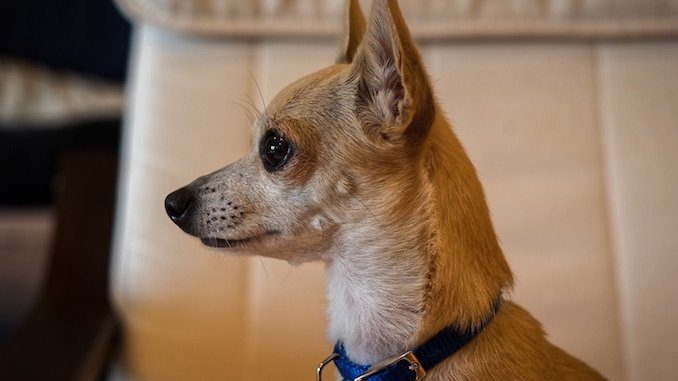
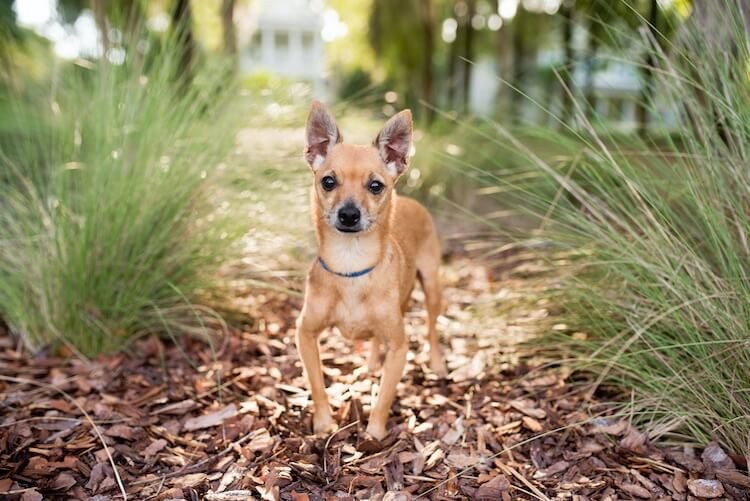
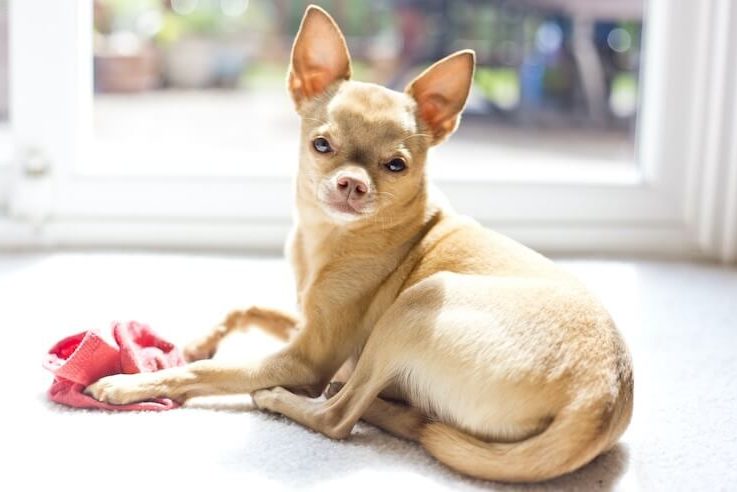
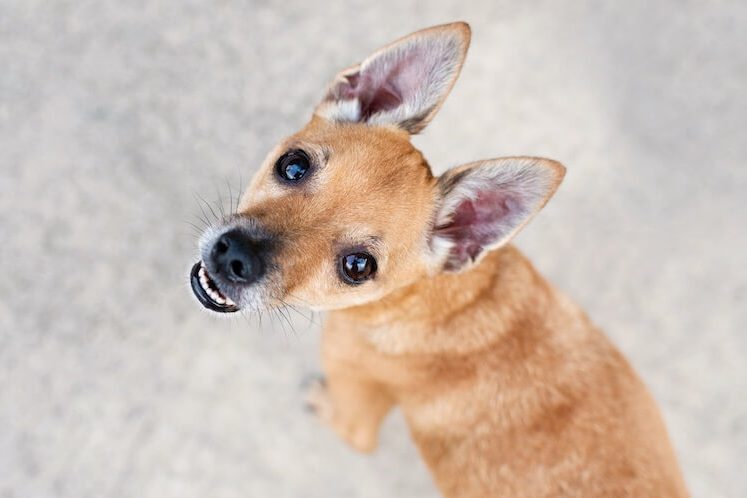
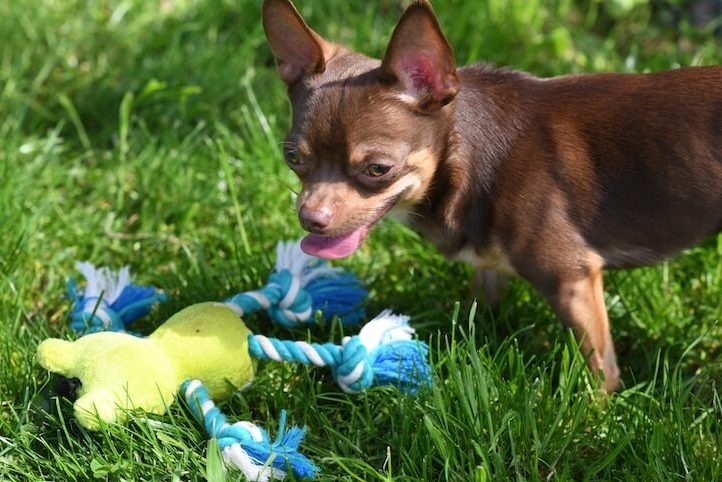
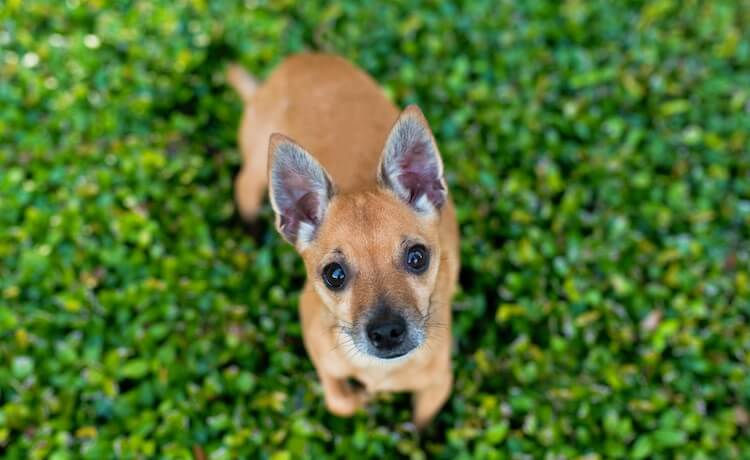
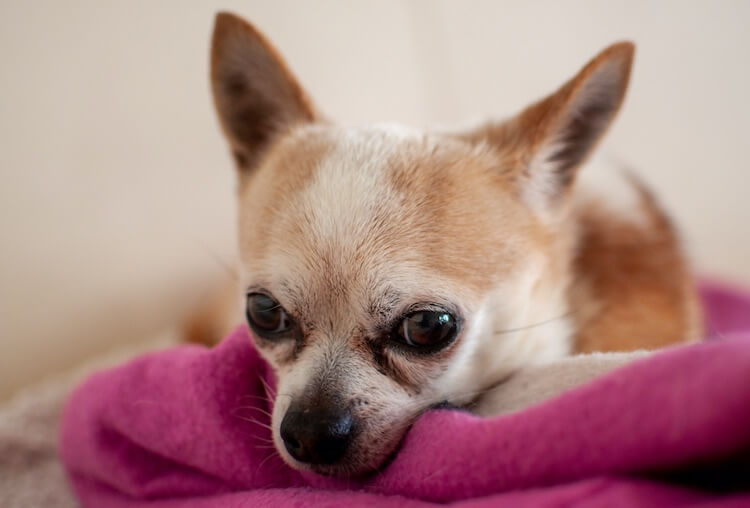

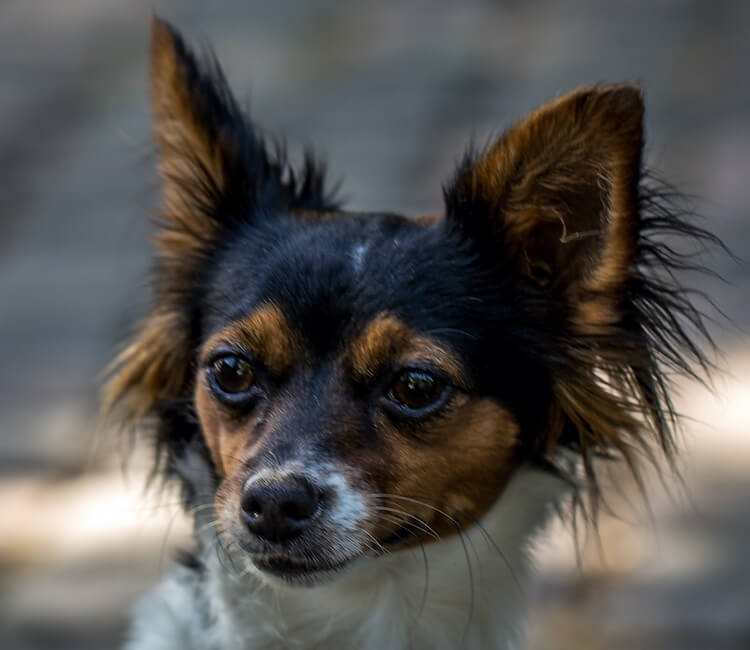
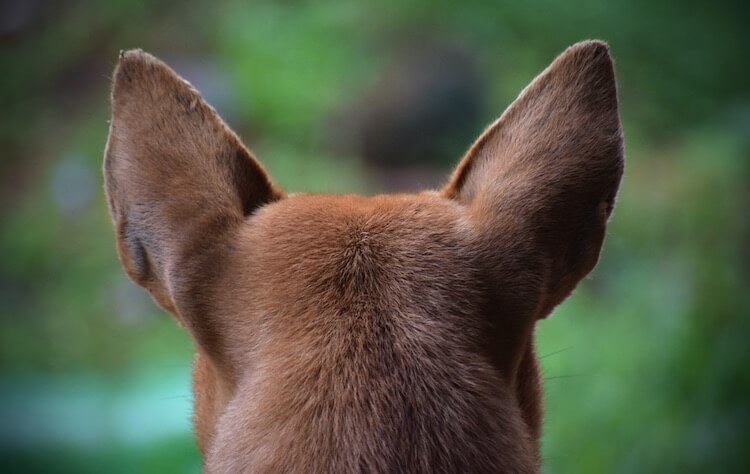
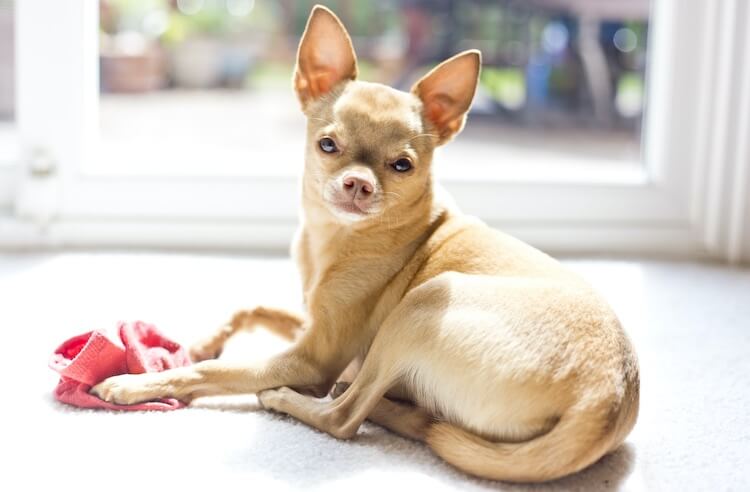



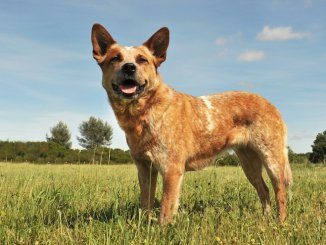
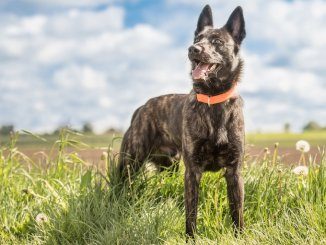
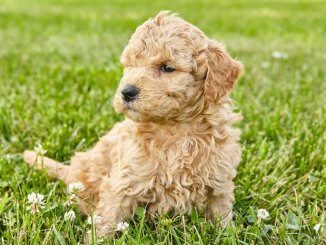
We just got a 4-6 year old chi, she was in a foster home for 2 years. The first time I met her, she bit me. For days, I left her alone and let her come to me. Now, she is “MINE”, still, very nervous and weary of everything. Your article really helped me a lot. Thanks.
I recently adopted a pair of bonded chi’s. Male and female, 14 wks old. Daisy is a very loving and snuggly girl while Brody took his time warming up. Two weeks later and Brody has come around so much that Daisy is now jealous. We are a happy family of 3…
I don’t really appreciate saying that they are all happy and aggressive. There are plenty who are chill calm pups. Chi’s are easily fearful but exposing them to as many different environments, people, dogs, etc goes a very long way to making them calm confident pups.
I adopted a deer chihuahua 1 week ago. She has bonded tight with me and loves my husband almost as much she loves me. She has been easy to socialize with other dogs, loves taking walks. She doesn’t get all nervous around new people but will tuck her tail and stand close to me and if the new person doesn’t try to interact with her to quickly she warms up fairly fast. So, thank you to the person who wrote in saying not all chihuahua are the way you’ve described them.
I have a 2yr.old dear head. I let him back in the house after he does his business. I noticed that every time I gave him a treat he would do a circle. Now when we are outside playing I say do circle he runs and does a figure 8. After that we will be inside and stands up on his back legs and turns 3 or more circles. We did not teach him no tricks. He does more tricks on his own. We would like to find someone who wants to breed there dear head female all we want is a pick of the litter before we have him fixed.